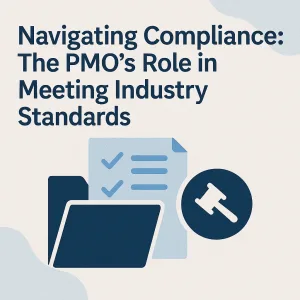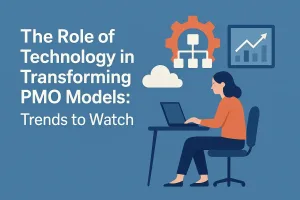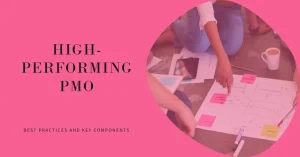Introduction to PMO Governance
The Project Management Office (PMO) plays a pivotal role in ensuring that projects are executed efficiently and effectively. Understanding what a PMO means and its governance framework is essential for compliance officers and project managers alike.
Definition of PMO
A Project Management Office (PMO) is a centralized unit within an organization that standardizes project management practices and facilitates the successful execution of projects. The PMO serves several key functions, including:
- Governance: Establishing policies, procedures, and standards for project management to ensure consistency and quality across projects.
- Support: Providing resources, tools, and training to project teams to enhance their capabilities and performance.
- Oversight: Monitoring project progress and performance, ensuring alignment with organizational goals and objectives.
The PMO acts as a bridge between project teams and senior management, ensuring that projects are not only completed on time and within budget but also align with the strategic vision of the organization.
Importance of Governance in PMOs
Governance within PMOs is crucial for several reasons:
- Ensuring Compliance: A well-defined governance framework helps PMOs adhere to industry regulations and standards, minimizing risks associated with non-compliance. This is particularly important in industries such as healthcare, finance, and construction, where regulatory requirements are stringent.
- Enhancing Project Success: Effective governance structures facilitate better decision-making, resource allocation, and risk management, leading to higher project success rates. By establishing clear roles and responsibilities, PMOs can ensure accountability and transparency throughout the project lifecycle.
- Stakeholder Engagement: Governance frameworks promote stakeholder involvement and communication, which are vital for project buy-in and support. Engaging stakeholders early and often helps to identify potential issues and align project objectives with stakeholder expectations.
Overview of Industry Standards and Regulations Relevant to PMOs
PMOs must navigate a complex landscape of industry standards and regulations that impact their operations. Some of the key frameworks and guidelines include:
- PMBOK Guide: The Project Management Body of Knowledge (PMBOK) provides a comprehensive set of standards and best practices for project management, serving as a foundational reference for PMOs.
- PRINCE2: This structured project management method emphasizes governance and control, offering a framework that PMOs can adopt to enhance their governance practices.
- ISO 21500: This international standard provides guidance on project management concepts and processes, helping PMOs align their practices with global standards.
- Regulatory Compliance: Depending on the industry, PMOs may need to comply with specific regulations such as GDPR in data protection, HIPAA in healthcare, or Sarbanes-Oxley in financial reporting.
Understanding PMO governance is essential for compliance officers and project managers to ensure that their projects not only meet organizational goals but also adhere to the necessary regulatory frameworks. By establishing robust governance structures, PMOs can enhance project success and maintain compliance.
Understanding PMO Governance
The concept of governance plays a crucial role in ensuring that projects are executed effectively and align with organizational objectives. This section delves into the definition of governance within project management, the key components of PMO governance, and the relationship between governance practices and project outcomes.
Definition of Governance in Project Management
Governance in project management refers to the framework of authority, roles, responsibilities, and processes that guide project execution and decision-making. It establishes the structure through which project objectives are defined, monitored, and achieved, ensuring that projects align with the strategic goals of the organization. Effective governance provides a clear pathway for accountability and transparency, which is essential for managing risks and ensuring compliance with industry standards and regulations.
Key Components of PMO Governance
PMO governance encompasses several critical components that work together to create a robust framework for managing projects:
- Policies: These are the formal guidelines that dictate how projects should be managed within the organization. Policies cover various aspects, including project selection criteria, resource allocation, risk management, and compliance with regulatory requirements. They ensure consistency and provide a basis for decision-making across all projects.
- Processes: Defined processes are essential for the systematic execution of projects. This includes methodologies for project planning, execution, monitoring, and closure. Well-established processes help in standardizing practices across the PMO, facilitating better communication and collaboration among project teams.
- Oversight: Oversight mechanisms are vital for monitoring project performance and ensuring adherence to governance policies and processes. This includes regular reviews, audits, and performance assessments that help identify deviations from the planned objectives and allow for timely corrective actions. Oversight ensures that projects remain aligned with organizational goals and comply with relevant regulations.
The Relationship Between PMO Governance and Project Outcomes
The effectiveness of PMO governance directly impacts project outcomes. A well-governed PMO can lead to:
- Improved Project Success Rates: By adhering to established policies and processes, projects are more likely to meet their objectives, stay within budget, and be completed on time. Governance frameworks help in identifying potential risks early and implementing mitigation strategies.
- Enhanced Stakeholder Satisfaction: Effective governance fosters transparency and accountability, which are crucial for building trust among stakeholders. When stakeholders are kept informed and involved in the decision-making process, their satisfaction with project outcomes increases.
- Regulatory Compliance: In industries with stringent regulatory requirements, PMO governance ensures that projects comply with all relevant laws and standards. This not only mitigates legal risks but also enhances the organization’s reputation and credibility.
Understanding PMO governance is essential for compliance officers and project managers alike. By establishing a strong governance framework, organizations can navigate the complexities of project management, ensuring that projects are executed efficiently and effectively while adhering to industry standards and regulations.
Industry Standards Impacting PMOs
Understanding the regulatory framework and industry standards is crucial for ensuring compliance and effective governance. This section outlines key industry standards that significantly influence PMO operations, providing a foundation for compliance officers and project managers to navigate the complexities of project governance.
Overview of Common Standards
- PMBOK (Project Management Body of Knowledge): Developed by the Project Management Institute (PMI), PMBOK is a comprehensive guide that outlines best practices, processes, and terminologies in project management.
- It serves as a foundational framework for PMOs, offering guidelines on project lifecycle management, stakeholder engagement, and risk management.
- PRINCE2 (Projects IN Controlled Environments): PRINCE2 is a structured project management method widely adopted in the UK and internationally. It emphasizes organization, control, and quality in project delivery.
- This standard provides a clear framework for PMOs to manage projects effectively, focusing on defined roles, responsibilities, and processes.
- ISO 21500: The International Organization for Standardization (ISO) developed ISO 21500 to provide guidance on project management concepts and processes.
- This standard is designed to be applicable to any organization, regardless of size or industry, and helps PMOs align their practices with international best practices.
How These Standards Guide PMO Practices and Processes
- Framework for Consistency: These standards provide a structured approach that PMOs can adopt to ensure consistency in project execution. By following established guidelines, PMOs can enhance their credibility and reliability in delivering projects.
- Risk Management: Standards like PMBOK and PRINCE2 emphasize the importance of risk management, enabling PMOs to identify, assess, and mitigate risks effectively throughout the project lifecycle.
- Stakeholder Engagement: Effective communication and stakeholder management are critical components outlined in these standards. PMOs can leverage these guidelines to foster better relationships with stakeholders, ensuring their needs and expectations are met.
The Role of Certifications and Their Impact on PMO Governance
- Professional Development: Certifications such as PMP (Project Management Professional) and PRINCE2 Practitioner validate the skills and knowledge of project managers and PMO staff. These credentials enhance the professionalism of the PMO and contribute to its governance framework.
- Compliance and Best Practices: Holding relevant certifications ensures that PMO personnel are well-versed in industry standards, which is essential for maintaining compliance with regulatory requirements and best practices.
- Continuous Improvement: Certifications often require ongoing education and training, promoting a culture of continuous improvement within the PMO. This commitment to learning helps PMOs adapt to changing industry standards and regulations.
Understanding and implementing key industry standards such as PMBOK, PRINCE2, and ISO 21500 is vital for PMOs. These standards not only guide PMO practices and processes but also play a significant role in enhancing governance and compliance within project management. By prioritizing certifications and adherence to these standards, PMOs can navigate the regulatory scene effectively, ensuring successful project outcomes.
Regulatory Frameworks Affecting PMOs
The Project Management Office (PMO) plays a crucial role in ensuring that projects align with organizational goals and comply with relevant regulations. Understanding the regulatory frameworks that impact PMOs is essential for compliance officers and project managers alike. This section delves into the definition of regulatory frameworks, their implications on PMO operations, highlighting the challenges faced by PMOs in navigating these regulations.
Definition and Examples of Regulatory Frameworks Relevant to Project Management
Regulatory frameworks refer to the set of rules, guidelines, and standards that govern how projects are managed within specific industries. These frameworks can vary significantly depending on the sector, geographical location, and the nature of the projects being undertaken. Some key examples include:
- ISO Standards: The International Organization for Standardization (ISO) provides a range of standards relevant to project management, such as ISO 21500, which offers guidance on project management concepts and processes.
- PMBOK Guide: The Project Management Institute (PMI) publishes the PMBOK (Project Management Body of Knowledge) Guide, which outlines best practices and standards for project management.
- Regulatory Compliance Standards: Industries such as healthcare, finance, and construction are subject to specific regulations (e.g., HIPAA in healthcare, Sarbanes-Oxley in finance) that dictate how projects must be managed to ensure compliance.
These frameworks not only provide a structure for project execution but also establish compliance requirements that PMOs must adhere to in order to mitigate risks and ensure project success.
Implications of Compliance Requirements on PMO Operations
Compliance requirements can significantly influence PMO operations in several ways:
- Resource Allocation: PMOs may need to allocate additional resources to ensure compliance with regulatory standards, which can impact project budgets and timelines.
- Training and Development: Continuous training is essential for PMO staff to stay updated on regulatory changes and compliance requirements, necessitating investment in professional development.
- Risk Management: PMOs must implement robust risk management strategies to identify and mitigate compliance-related risks, which can complicate project planning and execution.
- Reporting and Documentation: Compliance often requires extensive documentation and reporting, which can increase the administrative burden on PMOs and necessitate the use of specialized tools and software.
These implications highlight the need for PMOs to integrate compliance considerations into their project management processes to ensure that they meet regulatory standards while achieving project objectives.
Best Practices for PMO Compliance
A Project Management Office (PMO) plays a crucial role in ensuring that projects align with organizational goals and adhere to industry standards and regulations. To enhance compliance, PMOs must adopt best practices that not only streamline processes but also foster a culture of accountability and transparency. Here are some actionable strategies for PMOs to enhance compliance with industry standards and regulations:
1. Developing a Compliance Framework within the PMO
Creating a robust compliance framework is essential for PMOs to navigate the complexity of industry regulations. This framework should include:
- Clear Policies and Procedures: Establish comprehensive policies that outline compliance requirements specific to the industry. These should be easily accessible and regularly updated to reflect any changes in regulations.
- Integration with Project Management Processes: Ensure that compliance considerations are integrated into all project management processes, from initiation to closure. This includes risk management, quality assurance, and stakeholder engagement.
- Stakeholder Engagement: Involve key stakeholders in the development of the compliance framework to ensure it meets the needs of the organization and aligns with regulatory expectations.
2. Regular Training and Awareness Programs for Project Teams
To foster a culture of compliance, it is vital to invest in training and awareness programs for project teams. This can be achieved through:
- Onboarding Programs: Incorporate compliance training into the onboarding process for new team members to ensure they understand the importance of compliance from the outset.
- Ongoing Training Sessions: Schedule regular training sessions to keep project teams informed about the latest regulations, compliance best practices, and any changes to internal policies.
- Interactive Workshops: Utilize workshops and simulations to engage team members in real-world compliance scenarios, enhancing their understanding and ability to apply compliance measures effectively.
3. Establishing a Monitoring and Reporting Mechanism for Compliance
A proactive approach to compliance involves establishing a robust monitoring and reporting mechanism. This includes:
- Regular Audits and Assessments: Conduct periodic audits to assess compliance with established policies and procedures. This helps identify areas for improvement and ensures adherence to regulatory requirements.
- Performance Metrics: Develop key performance indicators (KPIs) related to compliance that can be tracked over time. This allows PMOs to measure the effectiveness of their compliance efforts and make data-driven decisions.
- Transparent Reporting: Implement a transparent reporting system that allows for the documentation and communication of compliance status to stakeholders. This fosters accountability and encourages a culture of compliance within the organization.
By implementing these best practices, PMOs can enhance their compliance with industry standards and regulations, ultimately leading to more successful project outcomes and a stronger organizational reputation.
Challenges in PMO Governance and Compliance
The Project Management Office (PMO) plays a crucial role in ensuring that projects align with organizational goals and adhere to industry standards. However, PMOs often encounter significant challenges in governance and compliance that can hinder their effectiveness. Here are some key obstacles that PMOs face:
- Identifying Gaps in Current Governance Structures: One of the primary challenges for PMOs is the identification of gaps within existing governance frameworks. Many organizations may have outdated or poorly defined governance structures that do not adequately support project oversight. This can lead to inconsistencies in project execution, lack of accountability, and difficulties in measuring project success. PMOs must conduct thorough assessments to pinpoint these gaps and implement necessary changes to enhance governance practices.
- Navigating Conflicting Regulations Across Different Regions or Sectors: PMOs often operate in a global environment where they must comply with various regulations that can differ significantly from one region or sector to another. This complexity can create confusion and increase the risk of non-compliance. For instance, a PMO managing projects in both the European Union and the United States must navigate the General Data Protection Regulation (GDPR) in Europe while adhering to different data protection laws in the U.S. This requires a deep understanding of the regulatory topic and the ability to adapt governance practices accordingly.
- Addressing Resistance to Change Within Project Teams: Implementing new governance frameworks or compliance measures often meets with resistance from project teams. Team members may be accustomed to existing processes and may view changes as disruptive or unnecessary. This resistance can impede the successful adoption of governance initiatives. PMOs must engage in effective change management strategies, including clear communication of the benefits of new governance practices, training sessions, and involving team members in the development of new processes to foster buy-in and reduce pushback.
By addressing these challenges, PMOs can enhance their governance frameworks, ensure compliance with relevant regulations, and ultimately drive project success. Understanding the regulatory landscape and fostering a culture of adaptability within project teams are essential for navigating the complexities of PMO governance.
The Future of PMO Governance
As organizations continue to adapt to a rapidly changing business enviroment, the role of Project Management Offices (PMOs) is evolving significantly. This section explores the future of PMO governance, focusing on the impact of digital transformation, emerging regulatory trends, and the PMO’s evolving role in strategic governance.
Impact of Digital Transformation and Technology on PMO Governance
- Integration of Advanced Technologies: The rise of digital tools and platforms is reshaping how PMOs operate. Technologies such as artificial intelligence (AI), machine learning, and data analytics are enabling PMOs to enhance decision-making processes, improve project tracking, and optimize resource allocation. These tools facilitate real-time data analysis, allowing PMOs to respond swiftly to project changes and stakeholder needs.
- Remote Collaboration Tools: With the increase in remote work, PMOs are leveraging collaboration tools to maintain communication and project oversight. This shift not only enhances team collaboration but also necessitates new governance frameworks to ensure compliance and accountability in a virtual environment.
- Agile Methodologies: The adoption of agile practices is becoming more prevalent within PMOs, promoting flexibility and responsiveness to change. This shift requires PMOs to develop governance structures that support iterative processes while ensuring compliance with industry standards and regulations.
Emerging Trends in Regulatory Compliance and Standards
- Increased Focus on Compliance: As regulatory environments become more complex, PMOs must stay abreast of changes in compliance requirements. This includes understanding industry-specific regulations and ensuring that project management practices align with these standards. The future will likely see PMOs taking a more proactive role in compliance management, integrating regulatory considerations into project planning and execution.
- Standardization of PMO Practices: There is a growing trend towards the standardization of PMO practices across industries. Organizations are increasingly looking to frameworks such as the Project Management Institute’s (PMI) PMBOK and ISO standards to guide their governance processes. This standardization not only enhances consistency but also facilitates compliance with regulatory requirements.
- Sustainability and Ethical Governance: As organizations prioritize sustainability, PMOs will need to incorporate environmental, social, and governance (ESG) criteria into their project management practices. This shift will require PMOs to develop governance frameworks that address ethical considerations and promote sustainable project outcomes.
Evolving Role of PMOs in Strategic Organizational Governance
- Strategic Alignment: The future of PMO governance will see a stronger alignment between project management and organizational strategy. PMOs will be expected to play a critical role in ensuring that projects contribute to the overall strategic goals of the organization. This alignment will require PMOs to engage with senior leadership and stakeholders to understand strategic priorities and adjust project portfolios accordingly.
- Enhanced Stakeholder Engagement: As PMOs take on a more strategic role, they will need to enhance their engagement with stakeholders. This includes not only project sponsors and team members but also external stakeholders such as regulators and industry bodies. Effective stakeholder management will be crucial for navigating the complexities of compliance and governance.
- Focus on Value Delivery: The emphasis on delivering value rather than merely completing projects will shape the future of PMO governance. PMOs will need to develop metrics and frameworks that measure project success in terms of value creation, ensuring that projects align with organizational objectives and stakeholder expectations.
The future of PMO governance is poised for significant transformation driven by technological advancements, evolving regulatory landscapes, and a shift towards strategic alignment. As PMOs adapt to these changes, they will play a pivotal role in ensuring compliance, enhancing organizational governance, and delivering value in an increasingly complex environment.
Conclusion
The significance of PMO (Project Management Office) governance cannot be overstated. It serves as a critical framework that ensures projects align with organizational goals while adhering to industry standards and regulations. Effective PMO governance not only enhances project success rates but also fosters accountability and transparency within project teams.
As compliance officers and project managers, it is essential to prioritize governance within your PMO practices. By doing so, you can mitigate risks, ensure compliance with regulatory requirements, and ultimately drive better project outcomes.
Moreover, standards and regulations is continually evolving. Staying informed about these changes is crucial for maintaining compliance and adapting your PMO strategies accordingly. Engaging with industry resources, attending relevant training, and participating in professional networks can provide valuable insights into emerging trends and best practices.
A robust PMO governance framework is vital for navigating the complexities of project management. By prioritizing governance and remaining vigilant about regulatory developments, compliance officers and project managers can enhance their effectiveness and contribute to the overall success of their organizations.
Find out more about Shaun Stoltz https://www.shaunstoltz.com/about/.
This post was written by an AI and reviewed/edited by a human.



